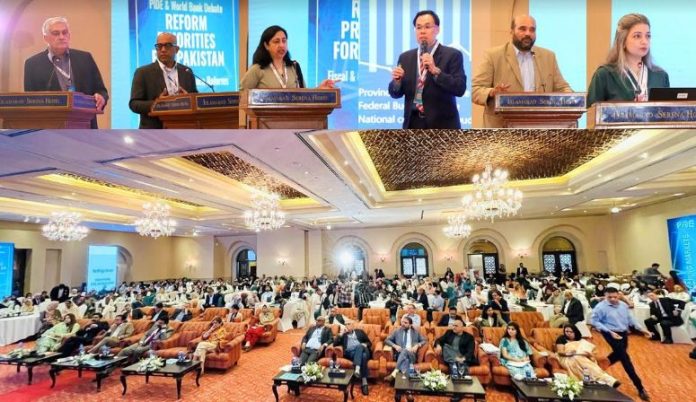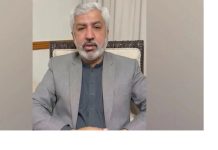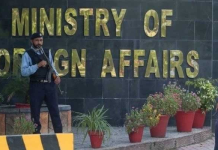ISLAMABAD, MAY 3 /DNA/ – A collaborative event between The World Bank Group (Pakistan) and the Pakistan Institute of Development Economics (PIDE) concluded successfully, bringing together an array of stakeholders committed to shaping Pakistan’s economic endeavours. This pivotal gathering, designed to support the nation’s new economic development agenda over the next five years, was marked by rich discussions and a shared commitment to actionable reforms.
Dr. Nadeem ul Haque, Vice Chancellor of the Pakistan Institute of Development Economics (PIDE), spearheaded a pivotal economic reform initiative titled “ISLAAH: Immediate Reform Agenda – IMF and Beyond,” beginning with his opening remarks at this significant event. This strategy emerges in response to Pakistan’s pressing need for substantial external financing, highlighted by an IMF report which necessitates over USD 120 billion in the next five years. Dr. Haque’s comprehensive reform agenda addresses crucial sectors including regulatory modernization, tax reform, market liberalization, energy efficiency, and enhancements in agriculture and banking. A key feature of the reforms is the introduction of a ‘Regulatory Guillotine’ aimed at eliminating burdensome regulations that hinder business growth and innovation. These reforms are designed to rejuvenate Pakistan’s economic landscape, facilitating a more business-friendly environment, optimizing export strategies, improving import regulations, and enhancing overall sectoral efficiencies. The goal is to catalyze investment, create jobs, and promote higher GDP growth, thus steering Pakistan towards long-term economic stability and prosperity.
While talking on “Reforms for a Brighter Future: Time to Decide,” Mathew Verghis, Regional Director of the World Bank Group (South Asia) stated that Pakistan’s economic model is unsustainable due to its reliance on borrowing to finance its fiscal and current account deficits, leading to a growing debt level, which has reached 80% of GDP. He further added that Pakistan’s spending exceeds its revenue, and it imports more than it exports, resulting in increased domestic and external borrowing. However, he also noted that Pakistan has the potential for a brighter future, leveraging its youth, natural resources, and strategic location to achieve 7-8% annual GDP growth, and emphasized the need to prioritize reforms addressing the current economic crisis.
Dr. Durre Nayab, Joint Director, PIDE talked about “Public Administration for the 21st Century”. She addresses critical inefficiencies in Pakistan’s governance system, proposing comprehensive reforms across various sectors including the cabinet, civil bureaucracy, judiciary, and local government. It highlights the necessity to reduce the size of the federal cabinet, limit political appointments, and emphasize expertise and performance in governance roles. The reforms aim to professionalize and streamline public administration by eliminating outdated practices, introducing competitive hiring processes, digitalizing operations, and enabling greater autonomy at the local government level. Additionally, the presentation calls for the restructuring of ministries and autonomous agencies to enhance transparency, accountability, and effectiveness in public service delivery, thereby aligning with modern governance standards and promoting a more responsive and efficient administrative framework.
Mr. Derek H.C. Chen, Senior Economist at the World Bank, outlines a comprehensive review of Pakistan’s federal tax system, aiming to enable a modern and efficient tax structure. It discusses the need for substantial reform due to Pakistan’s low revenue collection compared to international standards and the complexities within the current tax system marked by numerous special provisions and concessional rates. The review provides detailed analyses of specific taxes such as sales tax, personal income tax, and corporate income tax, revealing inefficiencies and the potential for broadening the tax base. Key recommendations include rationalizing concessions, enhancing tax policy and administration, and leveraging potential revenue from provincial sources. The chapter emphasizes the critical role of systematic and phased reforms to increase tax collection efficiency, support fiscal sustainability, and ensure equitable economic growth.
Dr. Ahmad Waqar Qasim, Senior Research Economist, PIDE extensively critiques the existing regulatory framework in Pakistan, highlighting it as a significant impediment to economic activity due to its complexity and the burdensome nature of obtaining permissions. It identifies the pervasive regulatory burden as an “invisible tax” that stifles economic initiatives across all sectors. The review underscores the necessity of a “Regulatory Guillotine” approach, which has been successful in various countries, to streamline regulations by eliminating unnecessary permissions and simplifying the process through digital governance. This approach is advocated as essential for fostering investment, enabling efficient markets, and reducing the bureaucratic inclination towards excessive control. The presentation also calls for the implementation of regular Regulatory Impact Analyses (RIA) to ensure new regulations are justified by clear cost-benefit analyses, thereby promoting transparency and accountability in regulatory practices. Overall, the document argues for substantial deregulation to remove the barriers currently hindering economic growth and investment in Pakistan.
Ms. Maliha Haider, Education Specialist at the World Bank, highlighted significant strides made in Pakistan’s educational system, including expanding access to free and compulsory education and introducing innovative reforms such as merit-based teacher recruitment and public-private partnerships. Despite these efforts, Pakistan still faces substantial challenges, underscored by its low education spending relative to South Asia, which contributes to high dropout rates and learning poverty. The document ‘Spend Better, Spend More: How to Make Education Expenditure Count for Children in Pakistan’ outlines a comprehensive reform agenda aimed at enhancing efficiency in public education expenditure to improve children’s learning outcomes. It emphasizes the need for increased spending to at least 4.3% of GDP, improving spending efficiency, equity, management, coordination, and greater involvement of parents and civil society. The proposed reforms are designed to address systemic inefficiencies and are supported by evidence-based approaches that promise enduring benefits and a foundation for continuous improvement in the education sector.
As the debate concluded, the participants expressed optimism about the adoption and implementation of the proposed reforms and the positive impacts they are expected to bring to Pakistan’s economy.
















